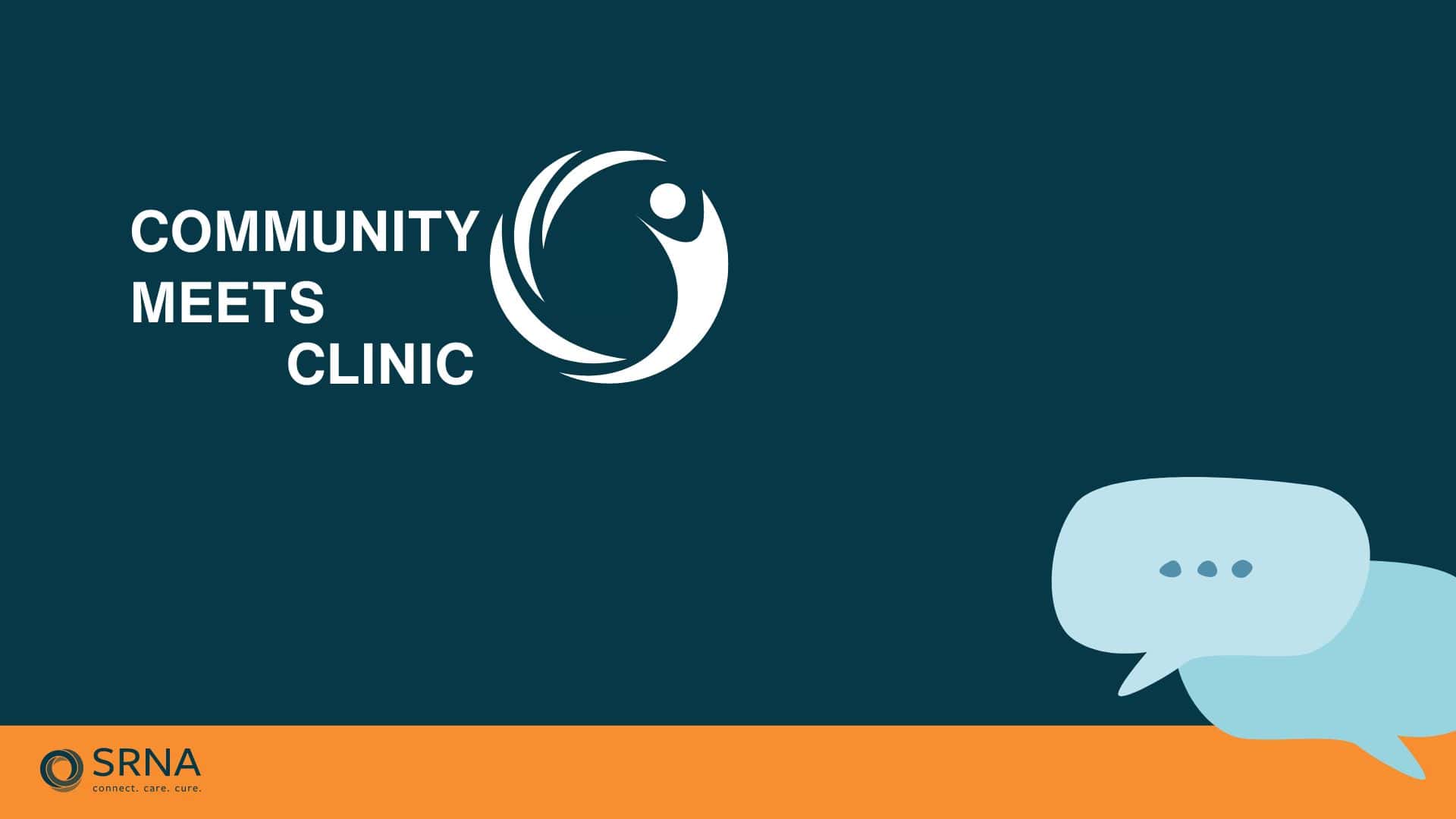Community Meets Clinic – Dr. Michael Levy
April 2, 2025
The “Community Meets Clinic” podcast series introduces clinicians and healthcare personnel specializing in rare neuroimmune disorders. In this episode hosted by Krissy Dilger of SRNA, we meet Dr. Michael Levy, a clinician from Massachusetts General Hospital. Dr. Levy is the Research Director of the Division of Neuroimmunology and Neuroinfectious Disease at Mass General and an Associate Professor at Harvard Medical School. He shared his journey into the field of neuroimmunology, discussed his research on the causes of MS, NMOSD, and MOGAD, and provided insights into the multidisciplinary clinic team at Mass General [01:27]. The episode also touched on the importance of understanding and reeducating the immune system to improve patient outcomes [15:22]. You can view Dr. Levy’s medical profile here.
00:00 Introduction
00:54 Meet Dr. Michael Levy
01:27 Dr. Levy’s Journey into Neuroimmunology
04:50 Research Focus and Discoveries
08:54 Clinic Operations at Mass General
12:12 Self-Care and Professional Fulfillment
15:22 Future of Neuroimmunology
16:52 Closing Remarks
Transcript
[00:00:02] Krissy Dilger: Welcome to the “Community Meets Clinic” series, a collaborative podcast to introduce clinicians, clinician scientists, and health care personnel working directly with individuals and families facing a rare neuroimmune diagnosis. Hear directly from those in the clinic and connect with the individuals whose focus is promoting quality of life for those diagnosed with a rare neuroimmune disorder.
[00:00:28] SRNA is a nonprofit focused on support, education, and research of rare neuroimmune disorders. You can learn more about us on our website at wearesrna.org. “Community Meets Clinic” is sponsored in part by Amgen; Alexion, AstraZeneca Rare Disease; and Genentech. My name is Krissy Dilger, and I moderated this episode.
[00:00:54] Today, we meet Dr. Michael Levy, a clinician from Massachusetts General Hospital. Dr. Levy is the Research Director of the Division of Neuroimmunology and Neuroinfectious Disease at Mass General and an associate professor at Harvard Medical School. You can view his full bio in the podcast description.
[00:01:15] Thank you so much for joining me today, Dr. Levy. I’m excited to speak with you and learn a bit more about you as well as the clinic at Mass General. And so, to start, can you tell me a little bit about yourself and what led you to neurology and in particular neuroimmunology?
[00:01:37] Dr. Michael Levy: Certainly, and thanks for having me, Krissy. It’s interesting, I interview a lot of residents for the neurology program here at Mass General and a lot of them say the exact same thing for why they enter neurology. And it’s the same answer I gave, which is we’re fascinated with the brain. It’s an amazing organ. It does everything that we perceive as humans from language to movement to thought and emotions and love and all that. And it’s just the most fascinating organ in the body and it’s the reason the whole body is alive, is just to support the brain so that we could do all the things that we love to do.
[00:02:16] Within neurology though there are many specialties, probably 20 of them, that handle different disease states. And the reason I chose neuroimmunology is that I remember as a resident at the Johns Hopkins Hospital where I did my residency, I didn’t come in to be a neuroimmunologist. My first plan was – I’d done a PhD in neurophysiology – I was going to do physiology. I was going to put needles into muscles and nerves and study them outside of the brain and the spinal cord.
[00:02:50] But pretty quickly into my residency the cases that kept me up all night where I would Google all night long, all these different symptoms, try to understand how they all came together. All of those cases ended up being neuroimmunological. And it was pretty quick, I would say within the first six months of my residency I knew what I wanted to do in neuroimmunology.
[00:03:13] But then there was another piece to this and that is that I was in the inpatient side a lot, not so much in the clinic. I was handling patients in the hospital. And in Baltimore at the time, that’s where Johns Hopkins is. In Baltimore at the time, early 2000s, we had a large program in Multiple Sclerosis and a lot of people from the Baltimore area who were enrolled in those trials for all these new MS drugs, they weren’t doing well. They were getting relapses and ended up in the hospital with me.
[00:03:44] And they’d say, “Doc, I’ve been doing everything my doctor was telling me to do, and I participated in this trial and I’m not doing well.” And that’s when the NMO antibody came along, 2005, 2006. And we started making all these diagnoses. And even as a resident I already declared I was like, “These people are different. We really have to take them out of the MS trials, first of all.” And all the MS docs were like, “Great, set up a clinic. Get them out. They’re ruining our MS trials.”
[00:04:15] So that’s how I accumulated about 500 NMO patients within about five years, because there was really no home for them up to then and the NMO antibody made it possible. And then that led into MOG and transverse myelitis and everything else. And of course, I met Doug Kerr who was at Johns Hopkins at the time, and he was my mentor in the lab and how I got my career started.
[00:04:37] Krissy Dilger: That’s awesome. And we’re all the better for it of course. You’ve made quite an impact on this community and we’re lucky to have someone so dedicated. Thank you. So, on the research side of things, you’ve done a lot of work specifically in rare neuroimmune disorders. Do you have any particular interest areas that you’re working on in research or any studies that you’ve conducted that you found particularly impactful?
[00:05: 10] Dr. Michael Levy: Yes. So, my area of interest is in understanding what causes the disease. Like fundamentally, why did you get MS? Why did you get NMO? Why did you get MOG? Why did these things happen? Why is your immune system messed up all of a sudden? Is it reacting to a virus? Is there something else in the environment? Is it all genetically based? Were you destined to get it? What is the basis of the disease for each of these diseases? So, I have people in the lab working on each disease and trying to understand the basis.
[00:05:40] In Multiple Sclerosis, for example, we’re really keen to understand the role of the Epstein-Barr Virus. This is a virus we all have. We get the infection as kids. It’s called kissing disease, because it’s spread by saliva. So, you take a drink of water and then your best friend takes a sip from the same cup. You share the germs and then EBV is spread that way. And by age 25, almost the entire population has been exposed. And then the virus lays dormant inside your B-cells, B as in boy, your B-cells in your body. These are immune cells that normally are like captains of the guard. They instruct the rest of the immune system what to do.
[00:06:20] And because the virus lives inside those cells, they can hijack the cell and then conduct the disease course from within these cells. And so, we’re trying to understand how does that happen. Why does – if we’re all exposed to EBV – why is MS only found in one in a 1.000 people? So, to try to understand all of that we have somebody working in the lab. And that will hopefully lead to antiviral drugs to use in MS.
[00:06:48] Now MOG seems to be different. MOG does not seem to be associated with any viruses or vaccines necessarily. The specific problem in MOG might be completely different even though clinically they look the same. And by MRI, they even look the same as MS, but they’re really immunologically very distinct and not related to the Epstein-Barr Virus for MOG.
[00:07:11] So what is MOG caused by? Well, we’re looking into relationships between the MOG protein and other things that look like MOG where maybe your immune system made a mistake. It reacted appropriately to something else, maybe something in your diet, for example. And then it sees MOG, and it says, “Wow, this is very similar to something I just fought off over here in the gut.” And then maybe causes an attack in the brain. I know that sounds crazy. Like why would the immune system make a mistake like that? Remember MOG is only one in 50,000 people. So, it’s a very rare mistake, but it could happen.
[00:07:47] And then Neuromyelitis Optica seems to be a completely separate thing altogether, where for whatever reason the immune system believes aquaporin-4 is harmful even though it’s a self-protein. Why does that you live 50 years with the knowledge that aquaporin-4 is self. Why does your immune system suddenly think it’s not self anymore, that it’s foreign, that it should be attacked? And why doesn’t it attack aquaporin-4 throughout the whole body? You have tons in the lung and then NMO people don’t have lung attacks. It’s all in the central nervous system.
[00:08:18] So trying to understand why the immune system turned on against aquaporin-4, but only in the central nervous system. We have mouse models to do that. So, we actually have mice with NMO in the lab. They’re hobbling around just trying to get to their food on one leg or two. But they’re a model for us to understand why they’re getting the disease and then maybe how to treat them eventually.
[00:08:42] Krissy Dilger: All very interesting research for sure and I look forward to maybe the day in the near future hopefully that we can have some answers to some of these questions. So, you lead the clinic at Mass General as we mentioned. Can you share more about your specific neuroimmunology multidisciplinary clinic team and what other specialists might a new patient expect to see if they have an appointment with you and how does a new patient typically get connected with you? Like what might that whole process look like?
[00:09:18] Dr. Michael Levy: It’s very easy. It should be very easy. Patients just have to call our hospital to our clinic and say, “I have NMO or MOG or MS or I’d like to be evaluated for those conditions or transverse myelitis.” And then they’ll get routed to me. And my office will request records just to confirm, to get everything in place, get all the MRIs. I need to see the MRIs to really know what’s going on in the brain or the spinal cord. We get all that together and then my office should be able to reach out and schedule the appointment.
[00:09:48] And we are in Boston. We’re in downtown Boston, which is only like 10, 15 minutes from the airport. So, it should be easy even people who don’t live in the Boston area. For them, they should just be able to fly in, come see me and then be able to go. And the reason for all that hassle is that state law requires that I’m licensed in the state where the patient lives not where I practice. So, if you live in New York, I can’t technically give you advice through telemedicine or anything else, because I’m not licensed in New York. So, you’d have to come up to Boston. That’s why the hassle.
[00:10:21] But then when you come see me, I have a whole team of fellows. These are people, some of whom have been supported by the SRNA, thank you, who work mostly in the lab, but also come to the clinic. And they’ll see you first and they’ll learn all about your condition, the transverse myelitis or whatever. And I’ll do as much teaching as I can and then I’ll see you and help you manage all of your issues, start your own treatment, whatever. And then you get to go home. And I’ll request follow-ups maybe once a year or every two years depending on what your condition is and how much you need to see me.
[00:10:54] And then as you suggested, there are other providers who may need to be involved. For example, if you have bladder issues that are beyond me, I could do simple things with the bladder, but if you have major bladder problems, you’re going to want to see a urologist, so we’ll connect you there. If you have other problems, you need a physical therapist, maybe you’ll need a new MRI, maybe you have social work issues. You need to be connected to someone who can help you with filing for disability claims. We have people who can help with that.
[00:11:26] A lot of those require local interactions like our social worker or our urologist. So, it can be hard sometimes to arrange everything all at once. But usually after your first visit then we can make a plan. And if we can’t handle your issue locally, I may be able to refer you to a urologist where you live. Might not be a major problem that you need a Mass General urologist for. But otherwise, if we can’t arrange something locally, we’ll bring you back to Boston. We’ll have more things arranged for you in your next visit.
[00:11:56] Krissy Dilger: So, I can imagine as a clinician especially when you are dealing with so much unknown with these disorders and just sometimes the stories and the cases you work with can be incredibly difficult. So how do you take care of yourself? How do you stay grounded? How do you reenergize so that you don’t lose yourself in the sometimes traumatic, the emotions and the trauma of these diagnoses along with your patients.
[00:12:28] Dr. Michael Levy: Yes. I’ll tell you a story. When I was in residency, I rotated on the psychiatry service, and I was taking care of patients with schizophrenia. And I really couldn’t handle that month. I would dream about my patients. That’s how traumatic it was for me. And I feel like I just couldn’t handle that. I couldn’t be a psychiatrist.
[00:12:49] But that’s not what my life is like in neuroimmunology. I really feel like it’s not work to come here into the office or into the lab and read and write and help patients. It doesn’t feel like work. It just feels like I’m doing something helpful, and I get excited about the research. So, I love what I do. And when I go on vacation, I actually miss work, and I want to come back. And my kids think I’m crazy, but I tell them all the time, if you do something you love you’ll never have to work a day in your life.
[00:13:22] Krissy Dilger: That’s awesome. And I’m glad that you found that for yourself and I hope everyone who’s listening can do the same. So, anything you’d like to share for someone who has one of these rare neuroimmune disorders who’s considering your clinic for care? Anything they should know or anything you’d like to share?
[00:13:46] Dr. Michael Levy: Yes. So, if you are coming, please bring all your information with you. It’s much better to have everything all upfront and be able to answer questions than to say, “Well, we have to test for this. then we have to test for that and follow-up after that.” It’s always best to have all the information upfront, but it can be hard to know what you need tested. And sometimes your doctors don’t know, because MOG is rare, NMO is rare, MS is fairly common, but it’d still be hard to know everything that we would want to test for. So sometimes it does take one or two visits to get all your questions answered, but it’s still good to have that expertise.
[00:14:23] I’ll also tell my patients honestly. I’ll say, “Your case is very straightforward. I think the hands you’re in at whatever city you’re coming from are fine and they can handle this.” And I can advise them, “And you don’t need to come back and forth all the time, because your case is fairly straightforward.” And then sometimes I’ll be honest with my patients and say, “Just come back here. I’m going to drag you back to Boston every year, because I really need to see you.”
[00:14:45] And so I try to be honest with everybody. And I would also say this, that having my fellows involved is I think really good for everybody not just for the fellows to learn from every case, but also for the patients to have access to more than one doctor. So, if I can’t return a message right away maybe one of my fellows can.
[00:15:10] Krissy Dilger: Thank you. So, we’re just about at the end of this podcast and I thank you so much for your time in answering all these questions. I just have one more to end on. What are you hopeful for in the future of rare neuroimmune disorders?
[00:15:29] Dr. Michael Levy: What I’m hopeful about is on the research side, I really feel like we’re coming to the point that we can truly reeducate the immune system, rather than just suppress it. Now don’t get me wrong. We have four great drugs in NMO, and they all suppress the immune system in some degree or another and they’re lifesaving. And I don’t feel bad about developing those drugs along with many of the colleagues in pharmaceutical companies. But you have to stay on them for life and they suppress your immune system and there could be long-term consequences to that.
[00:15:59] So I think a more promising approach is not just to suppress the immune system, but to actually reeducate it. To tell NMO patient’s immune systems that aquaporin-4 is not bad. To tell the immune system of a person with MOG, “Okay, I don’t know what triggered you but stop it.” And to tell an MS patient, their immune system, that EBV is not harmful, Epstein-Barr Virus is not harmful or even to just treat for the virus and have the disease go into remission. So, I really feel like we’re getting to the point where we’re actually treating the underlying problem rather than just masking it. suppressing the immune system. So that’s what I’m really excited about.
[00:16:39] Krissy Dilger: Awesome. Well, thank you so much. I hope to speak with you again. I’m sure I will soon enough in another podcast. Thank you.
[00:16:47] Dr. Michael Levy: Thank you, Krissy.
[00:16:52] Krissy Dilger: Thank you to our “Community Meets Clinic” sponsors, Amgen; Alexion, AstraZeneca Rare Disease; and Genentech. Amgen is focused on the discovery, development, and commercialization of medicines that address critical needs for people impacted by rare autoimmune and severe inflammatory diseases. They apply scientific expertise and courage to bring clinically meaningful therapies to patients. Amgen believes science and compassion must work together to transform lives.
[00:17:26] Alexion, AstraZeneca Rare Disease is a global biopharmaceutical company focused on serving patients with severe and rare disorders through the innovation, development, and commercialization of life transforming therapeutic products. Their goal is to deliver medical breakthroughs where none currently exist, and they are committed to ensuring that patient perspective and community engagement are always at the forefront of their work.
[00:17:53] Founded more than 40 years ago, Genentech is a leading biotechnology company that discovers, develops, manufactures, and commercializes medicines to treat patients with serious and life-threatening medical conditions. The company, a member of the Roche Group, has headquarters in South San Francisco, California. For additional information about the company please visit www.gene.com.
LISTEN & SUBSCRIBE
TO PODCAST
DOWNLOAD MP3
DOWNLOAD TRANSCRIPT












